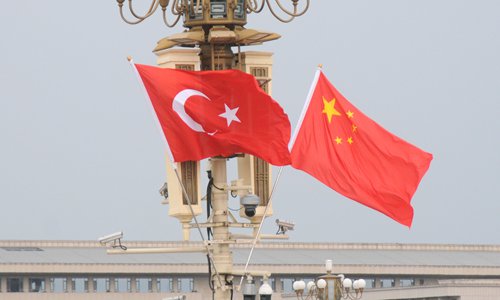HOME >> OPINION
China-Turkey ties revolve around Xinjiang
By Wang Yan Source:Global Times Published: 2019/7/8 20:18:40

Photo: IC
Turkish President Recep Tayyip Erdogan's visit to China on July 2 revived some confidence in the Turkish stock market and led to an uptick in the value of a weakening lira. In Beijing, Erdogan met with President Xi Jinping. The Turkish leader, who is braving political headwinds at home, said on his return to Turkey that cooperation in trade, investment, tourism and other fields with China will be upgraded. Media in Turkey said Erdogan's visit to China had led to the Turkish lira rising to 5.62 against the US dollar on July 2 and the Borsa Istanbul stock exchange crossing the 100,000 mark.
Erdogan's whirlwind visit not only led to a snapback in bilateral ties after remarks on Northwest China's Xinjiang Uyghur Autonomous Region made by a Turkish foreign ministry spokesman had soured relations, but also marked political consensus between China and Turkey on a deeper level of understanding.
In his meeting with Xi, Erdogan reiterated Turkey's firm commitment to the "one China" policy. He said it is true that people of all ethnic groups are living a prosperous and happy life in Xinjiang, stressing that Turkey is opposed to any attempt to drive a wedge between the two countries. He also pledged that Turkey is willing to enhance mutual trust and strengthen security cooperation with China.
China's policies on Xinjiang are part of its internal affairs that no other country has a right to interfere with. Erdogan's remarks on the Xinjiang question are the premise and guarantee for upgrade of bilateral cooperation.
The time-honored friendship between China and Turkey can be traced back to the ancient Silk Road era. For instance, the pronunciation of "tea" in Chinese is very similar to the way it is pronounced in Turkish, and the Chinese shadow puppetry was introduced into Turkey via the Silk Road and has become a model of Turkish folk art.
Since the founding of the People's Republic of China in 1949, China-Turkey relations have been based on cooperation and characterized by constructive and inclusive development. In August 1971, China and Turkey established diplomatic relations and boosted bilateral ties to strategic ones in October 2010. Therefore, strategic cooperative ties have evolved historically.
Currently, with 1,000 years of friendship based on the Silk Road, the China-proposed Belt and Road Initiative (BRI) has infused great potential for cooperation between the two countries.
China-Turkey ties have plunged thrice since the beginning of the 21st century over the Xinjiang question, which has become a barometer to observe this relationship.
Diplomacy is based on the core interests of a country. Turkey's non-interference in the Xinjiang question is the basis of win-win cooperation with China. As Xi said, China and Turkey should enhance mutual strategic trust and respect each other's core interests and major concerns on such issues as sovereignty, independence and territorial integrity. The two countries should also consolidate the political foundation of strategic cooperation and ensure that bilateral relations are always on a stable track
There is a saying: Judge a person by his deeds, not just by his words. It is hoped China and Turkey will keep their consensus on the Xinjiang question through sustained political cooperation and develop closer relations based on the principles of respect, trust and mutual benefit. Deepening China-Turkey relations will not only bring more opportunities for both countries, but also make contributions to world peace and global stability.
The author is a doctor of laws and an assistant research fellow at the Xinjiang Normal University. opinion@globaltimes.com.cn
Posted in: VIEWPOINT